A post in twelve brief chapters.
I
There's a shack by the tip of Long Lake. It's owned and operated by a guy who moved here from the city (thirty years on the big island, then thirty on Manhattan and now here...). We stop for my morning coffee.
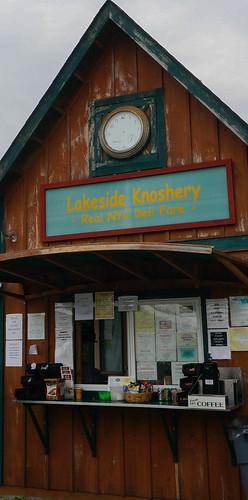
So, you have espresso...
Well, I'm out. I have decaf espresso. I'm guessing you don't want that.
I just want coffee. And we'll talk to each other. I'm referring here to the sign that says "no WiFi. Just talk to each other."
Ed and I have left over raisin bread and pepper jack cheese for breakfast.
II
We're riding in a jeep with a guy who is taking us and our kayak to the put in point.
My great great grandfather took a canoe up these lakes. 226 mile trip, in 1886. He kept a journal. Hey, his canoe is in the Adirondack Museum! You should go there. In the Fall, I'm going to follow his trail.
He's young -- he just joined the team at Raquette River Outfitters this year. In contrast, Ann and her partner Robbie, who own and run the place, have been doing this stuff for over thirty years: build, clean, rent, sell canoes. They know every put in point the region. They help us plan our trip.
We are impossible customers.
Royalite v. Kevlar canoe?
We'll be okay with Royalite (cheaper!).
But there's a 1.25 mile portage!
Let me lift it. Hmm. Still, you have to be so careful with the Kevlar.
It's a big portage.
We'll take the Kevlar (this from me).
On our first journey, we'll be going down Long Lake (day one), then following the Raquette River (day two), all the way to Tupper Lake (day three).
There are bugs on the river. You'll be okay once you get a fire going. Wear long pants.
No, I'm not taking long pants and we don't build fires. I grab her Balsam Ridge Herbals Extreme Summer Time Solution. We have the usual potent stuff, but I read recently that the oils are equally, if not more effective.
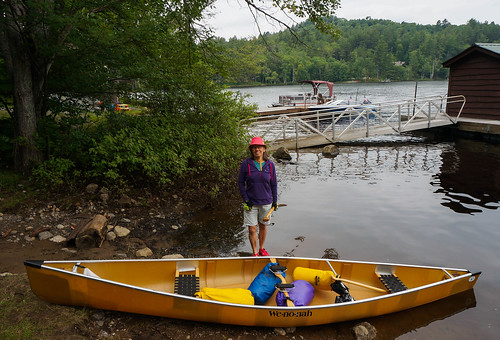
III
First set of issues: Ed leaves his sun hat (essential!) in the car and I leave my water bottle (even more essential!) in the jeep that took us to the put in point.
IV
Long Lake is well named! But out tip is pointing toward the Adirondacks.
You do not get views like this in the Midwest.
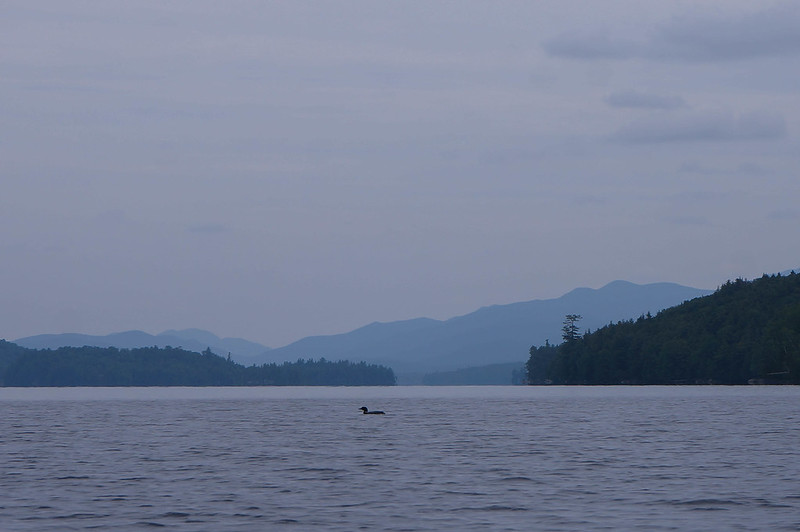
The water is clear. No algae. No run off. Luck New Yorkers. Someone worked hard to keep the supply of the City's drinking water clean.
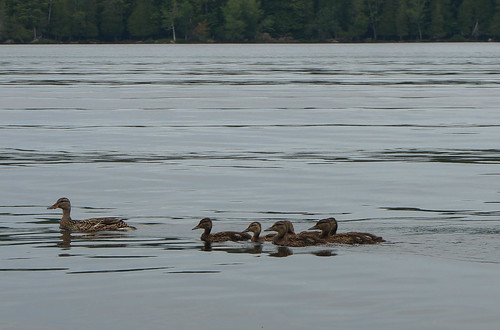
The raindrops make an appearance in the last hour, but they're gentle. Nonthreatening.
Long Lake permits speedboats of course and we do encounter them, but much more common are the skiffs, with a few guys fishing in them.
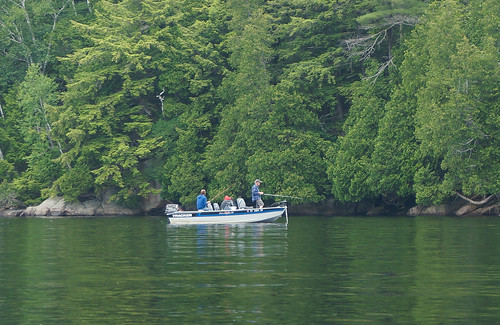
Do men talk about their wives in all the time they're on the boat?
Never.
Never?
Never - says my guy of great authority on the subject.
Maybe how to build a porch or put in a patio door?
Or what car to buy or politics.
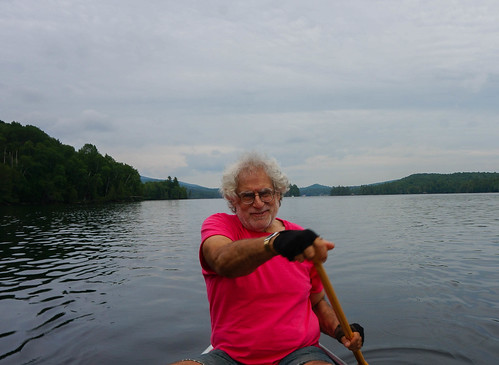
We do not encounter a single paddler. And yet it's hard to find a take out point that's not occupied by a skiff. Ed had thought we'd just find random spots to land, but that's not the way it works here. Most of the shoreline is inaccessible. Either the bank is steep or it's boggy. When there's enough of a clearing to pitch a tent, there are markers announcing this. Some are just okay spots, some are unusually beautiful. But along Long Lake, most have a skiff nearby and unless you're desperate, you do not land where someone already has set in.
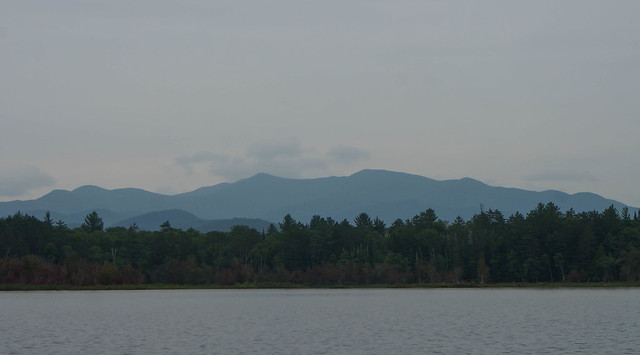
V
At the tip of the Lake, our absolutely last chance for docking for the night, we find, in fact, a beautiful spot. Ann had told us of it -- it's not yet marked and it really is lovely.
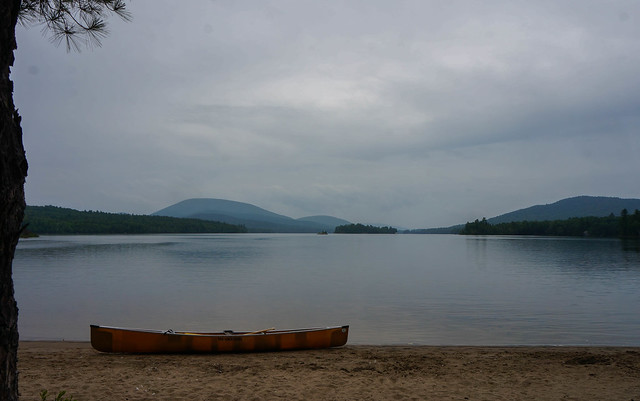
The mosquitoes? Moderately dense. We've seen worse, but they are bad enough to keep us inside the tent. It is, to me, like the porch back home -- a safe haven. As we pitch it and unpack, I smile at the routines we know so well! We've worked with this tent since backpacking trip two. (Trip one, in the Canadian Rockies had us in a leaky tent sized for 1.5 people. That would be all of Ed with little room for much else. This one is for two and fits us and our gear well.) It has protected us from bugs in Wisconsin, in Iowa and in the Upper Peninsula of Michigan. We've slept in it in French speaking Quebec and French speaking France. In California, we pitched it under redwoods, in Scotland -- under Douglas firs. There's a sweet space for my flashlight an book (though here's an upgrade: no flashlight needed for a Kindle!). In these remote places, it feels like home.
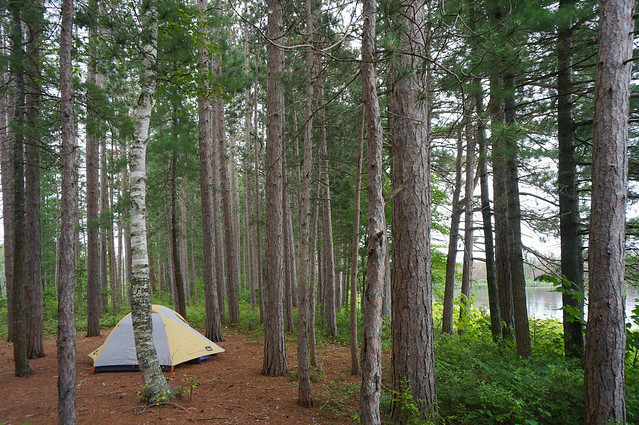
VI
On this first day, we barely paddled for four hours. Are we done now, in the early afternoon? It's raining. We dare not go further. It's hard to pitch a tent in the early miles of the Raquette River.
We head into the lake again...
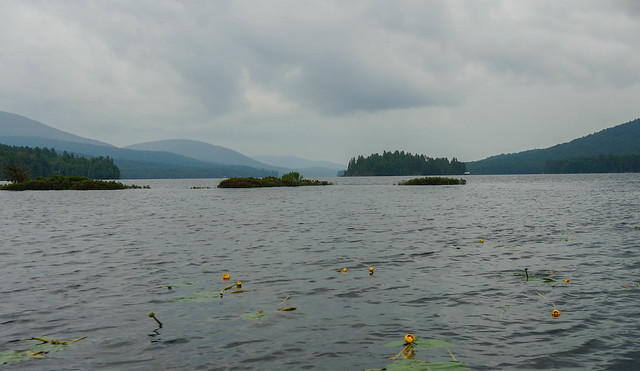
...then decide to explore a little at the river's beginnings. Lilies grow abundantly at the river's edge.
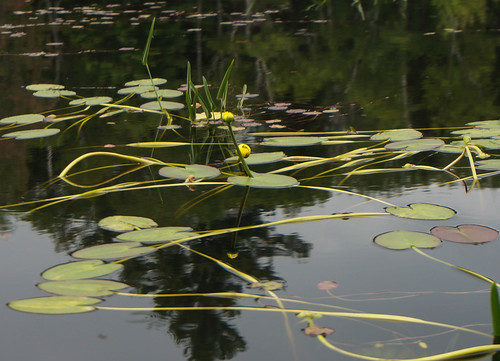
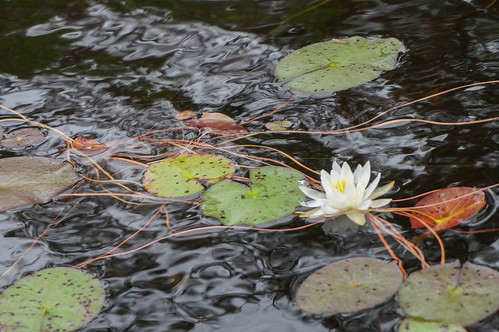
Ed navigates us toward some still water. All is quiet here. Except when it;s not and in a burst of anxious flight, a heron takes off. Quiet again. Then the stomp of something in the boggy water.
Want to get closer?
Can a moose or a bear swim?
Let's not disturb Mr. Big Splash further!
VII
Ed takes out his ancient cooking gizmo and starts a flame. Out comes the even more ancient pot for boiling water, the ouches with our selected dinners -- Mac and Cheese today.
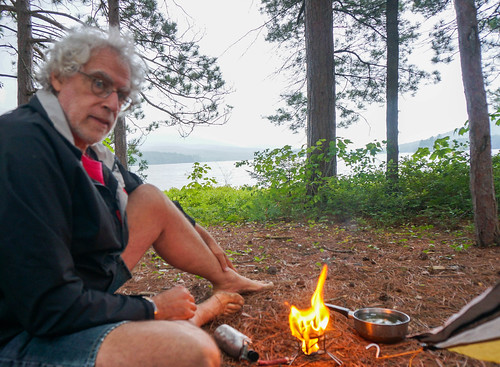
Shortly after, Ed falls asleep. On these adventuring outings, he so quickly loses himself to sleep that I sometimes wonder if this is what he looks for: the quiet mind that comes with the quiet landscape, from which there is no escape (because it's a long way to human contact).
For me, it's never really quiet the first night out. The rain on the tent, the plane above that sounds like thunder. The gallop.
What was that?
Deer probably.
Then deep, rhythmic breathing like sounds.
Ed? Do you hear it?
Uh huh.
What is it?
Frogs.
All night long, frogs huffed their rhythmic song.
VIII
We wake to a glorious morning outside.
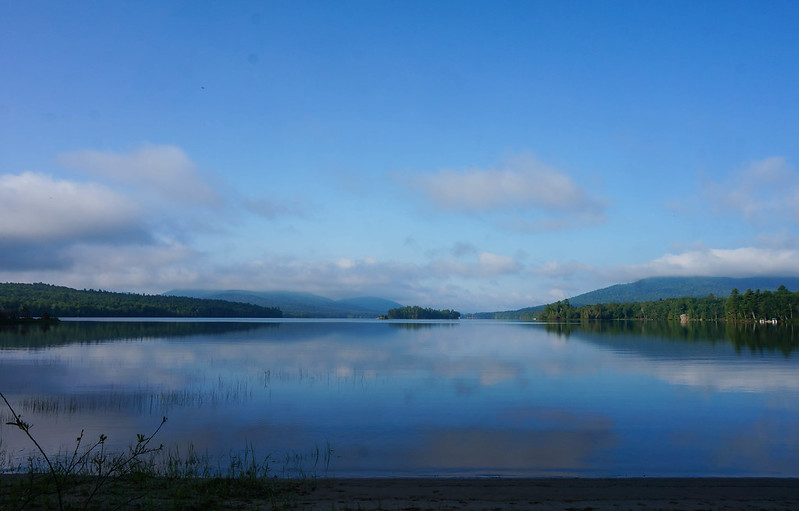
But who wants to leave the tent when there is a blanket of bugs clinging to the mesh, begging to come inside?
We watch them bounce and buzz. We tap the tent walls, they go into a tizzy then settle again.
As the sun begins to reach the forest grove, some of the bugs disperse. Enough for us to start moving. Familiar routines. Oatmeal, coffee. But inside. Bug free.
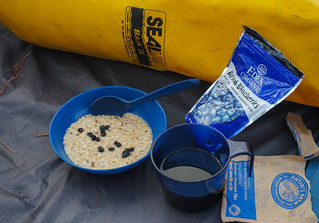
Fold tent, pack bags, set out.
IX
Or maybe not?
Get in the canoe?
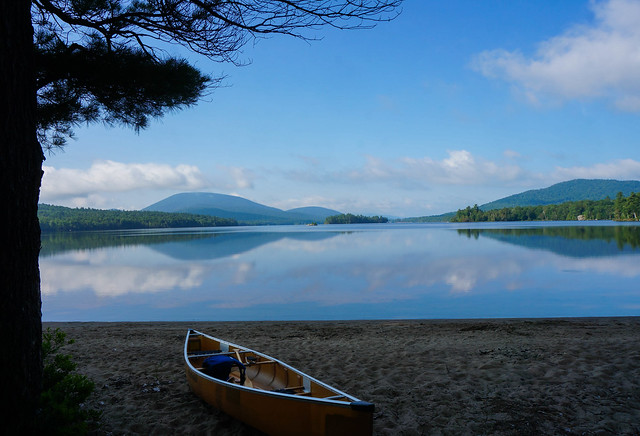
Not yet!
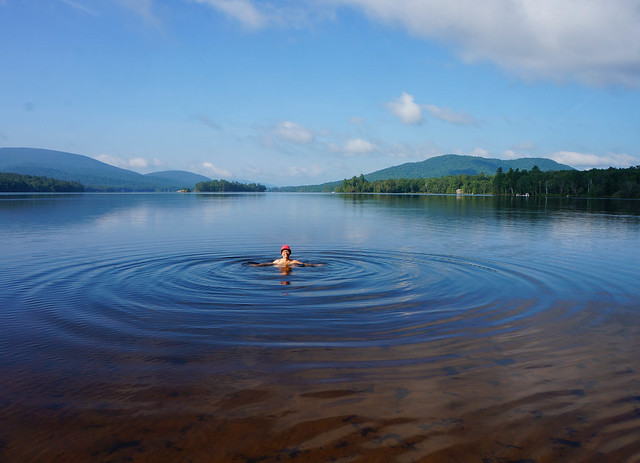
X
And now we are on the river. I could take a thousand photos and none would look like the other. You'll see just one or two. I'm writing on the fly, in the few hours I have between trips. Here's the river's peaceful moment.
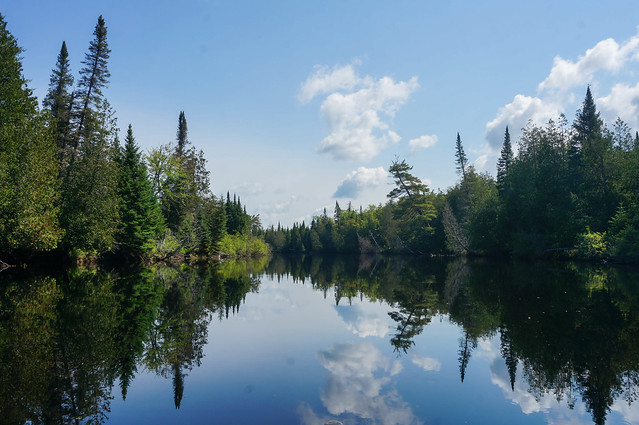
But there are many with a faster current. And then there are the famous Raquette Falls. We know about them and I am on the look out for the warning sign. (Will we miss it? Will we be thrown into the current?)
Of course, no one wants to lose a couple of tourists to the cascading river, so the sign is obvious and the take out point straightforward.
And now comes the moment of muscle truth -- the portage.
Ed takes the canoe and two of the light bags.
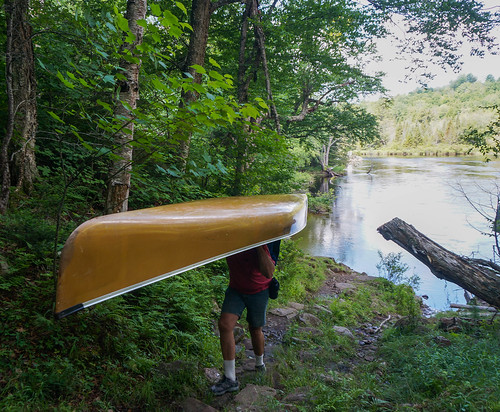
I take the three heavy sacks. Up the hill, then down again. A mile and a quarter, but it takes us forty minutes of huffing. I feel like the mule that I am, with my bags at my side.
It's a huge exhale for me when we get to the put out point.
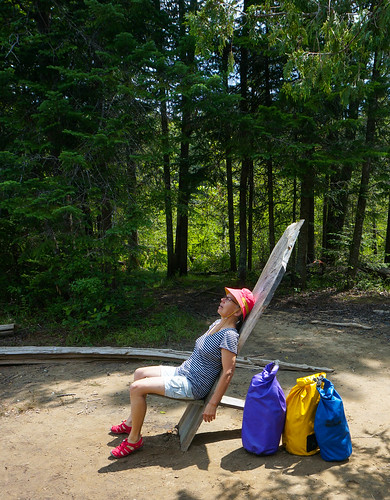
XI
A few hours past the falls, we're scheduled to set up camp again. The river here is very different. Beautiful, but at very high water levels, routinely overflowing.
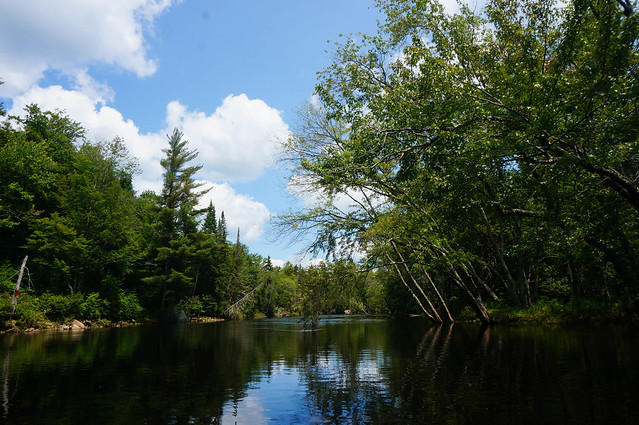
It's boggy and buggy and most importantly, it seems too early to stop. The skies are beautiful (too beautiful -- I'm just a touch too late with the application of sun screen). Why stop at 3? Or even 4?
I'll tell you why: because after you pass landing point number 26, there are no more wild camping possibilities until you reach Tupper Lake. If we don't stop now at 4, we'll have three hours of paddling left for sure. And what if the immediate lake-front landing spots are occupied? What then?
It's a tough call and I make knowing the risk involved (paddling in the evening without an obvious place to overnight). I want better for us than these last few riverside camping clearings. Wont the lake breezes disperse some of the bugs?
We pause for a quick lunch of trail mix, then continue.
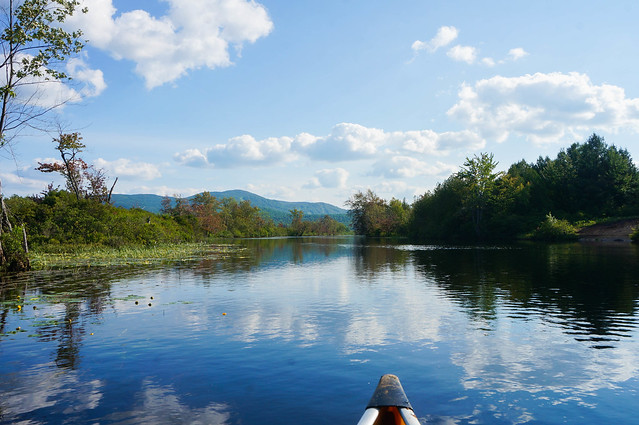
We paddle rhythmically, steadily. We started at 9 a.m., did not pause after the portage and now it's getting close to evening. My back, shoulders -- they're not used to so much use.
And still we continue.
XII
We are more lucky than I can possibly explain here. The very best possible camping spot is empty. At 7 p.m., after 10 hours of work (with only a 25 minute pause for lunch), we pull in.
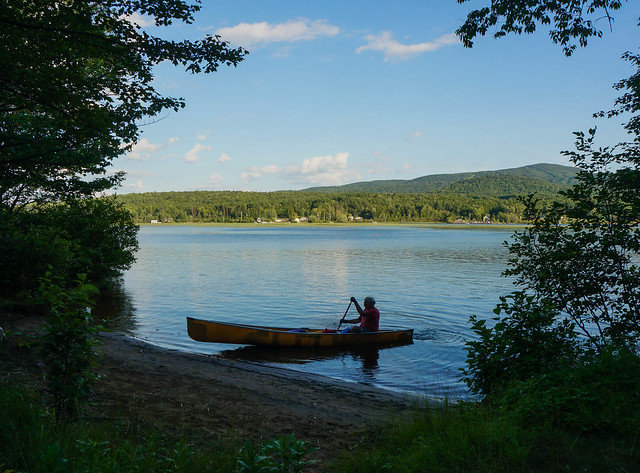
And here's the beauty of it: there is a breeze and it is almost completely bug free.
Curry for me and an ancient, dated camping packet for Ed labeled "beef stroganoff," from the years when he still ate beef (significantly before we met).
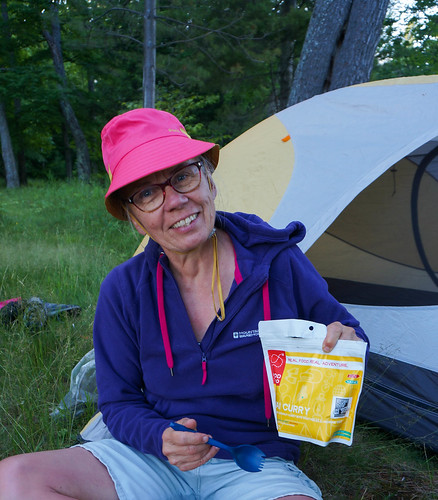
And the morning dawns bright and clear...
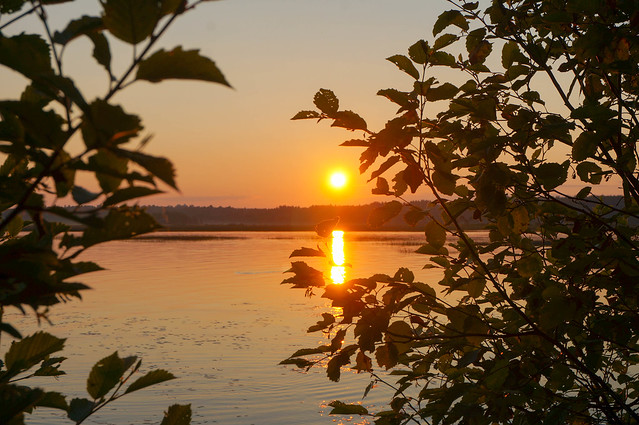
And the ducks keep us company for breakfast...
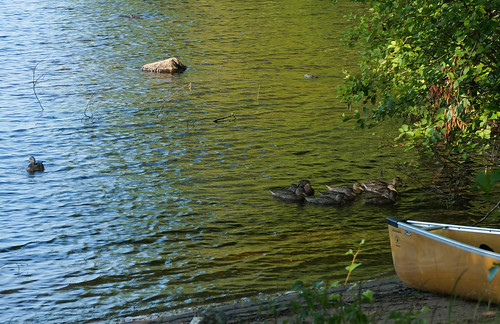
(We shoo them away. They should not be eating handouts. But one lingers, watching the morning preparations...)
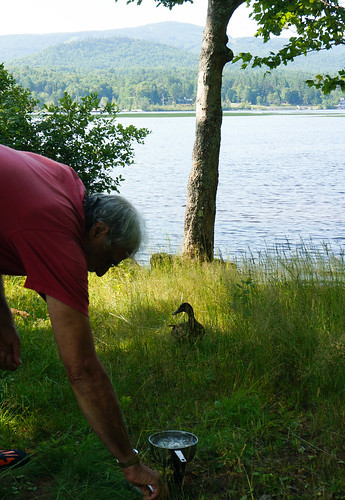
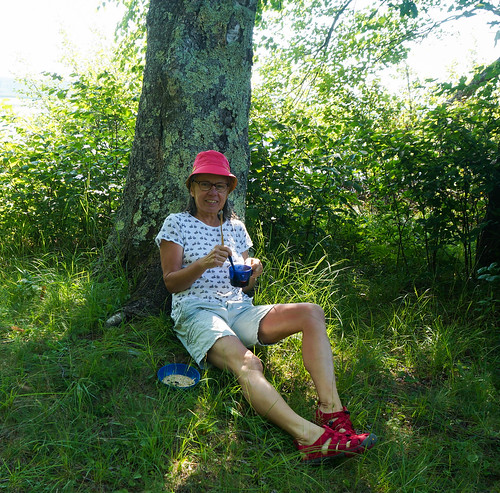
We're in a good (bug free!) place for very brisk "showering" (accomplished out of the lake, with the help of the tiny pot) and we do that today, ready now for the big village of Tupper Lake.
We paddle in the brief stretch of lake to our take out point at Tupper. And WiFi.
Post Scriptum
The storms are coming tomorrow. But that's tomorrow. We have a handful of grand days behind us. Arms stronger, souls well rested. We're ready for the Second Journey. (I'll be offline for at least two days. Too, my apologies for Flickr photo issues. I've tried to use a quick fix and I'm hoping to correct the previous photos with the embeded information when Flickr develops a permanent solution. It could be that my temporary improvised fix will wipe out all my photos. Be patient. Any such problems and editing issues I'll correct when I get home.)

